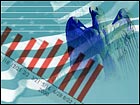|
Fed set to make history
|
 |
November 2, 2001: 5:24 a.m. ET
The Fed's current interest-rate-cutting campaign among the biggest in history.
By Staff Writer Mark Gongloff
|
NEW YORK (CNNmoney) - The Federal Reserve will make history if it cuts interest rates again on Tuesday, as most observers think it will.
The records are fuzzy, since the Fed hasn't always let us in on its rate-cutting decisions, but according to data maintained by the New York Federal Reserve, a 10th rate cut by the U.S. central bank will tie the record for the most cuts in a year, set in 1991, when the U.S. economy was last in recession.
The Fed has already set the record for the most percentage points shed in a year, as its nine cuts have taken its target for the fed funds rate, an overnight bank lending rate, to 2.5 percent from 6.5 percent at the start of the year.
The second-biggest point loss in one year was 3.125 points in 1975, when the economy was in another recession. In 1974, the fed funds rate started out at 9 percent, rose to 13 percent and then was slashed back to 8 percent. So the rate lost only one percent net for the year, but it was slashed 5 points during that year - when the economy was also in recession.
There were some enormous gains and losses in the fed funds rate between 1979 and the late 1980s, but the Fed didn't target that rate as an instrument of monetary policy during that time.
The rate was merely 10 times bigger during that mysterious era, too - about 20 percent, compared with just 2.5 percent today. The biggest point drops in the fed funds rate during that period came in 1980 and 1981, when the economy was in - surprise, surprise - another recession.
Click here for more on the Fed and rates
Most economists expect another recession - defined in all these instances as two or more consecutive quarters of shrinking gross domestic product (GDP) - this year, a result of the impact of the Sept. 11 terror attacks on an already weak economy.
We're still a far cry from the longest consecutive rate-cutting campaigns, which were waged in 1974-1976 (8.25 points cut) and 1989-1992 (6.75 points cut), and we probably won't approach those records this time; most economists think the cut expected Tuesday could be the Fed's last for awhile. 
|
|
|
|
|
|

|

